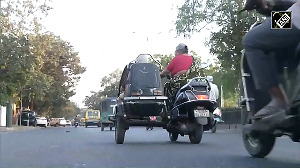'Pay Rs. 30 and insure free treatment up to Rs. 30,000.' That is the latest slogan of the Manmohan Singh government, which has provided such a unique insurance cover to those below the poverty line (BPL) for the first time in the history of the country.
Launched in April last from Delhi , this special health insurance scheme has become operational with effect from Wednesday (October 1 ) in 11 other states , including Uttar Pradesh , Union labour ministry director general (labour welfare) Anil Swarup told rediff.com.
All that the beneficiary is required to do is to shell out just Rs. 30 and in return assure a health insurance cover of Rs. 30000 - that too not in just a government hospital but in a host of private hospitals including some of the up,arket ones across the country.
With Rs 250 crores as seed money allocated in the 2008-09 central budget, the Rashtriya Swasthya Bima Yojana (National Health Insurance Program) envisages providing smart card-based, cashless health insurance cover up to Rs 30,000 to all BPL families in the unorganised sector over the next five years, during which as many as about 60 million people will be covered .Of these ,the beginning wasbeing made with 120 districts during the current financial year. .
The total sum insured will be Rs. 30,000 a family per annum, on a floater basis. It will cover all hospitalisation costs in any of the long list of hospitals with which the scheme has been tied up.
The Rashtriya Swasthya Bima Yojana is different from all other health insurance schemes brought in by the government in all these decades. Use of information technology and built in business interests of collaborating insurance companies and hospitals have provided a novel practicability to the scheme.
ICICI Lombard General Insurance Company Ltd., which is a joint venture of ICICI Bank Ltd. of India and Fairfax Financial Holdings Ltd. of Canada, has bagged the contract to introduce the scheme across the country.
The program gives full freedom to the beneficiary BPL family to select a hospital of their personal choice out of the listed ones for treatment. And the smart card comes in handy for migrant workers who were free to seek treatment wherever they might be engaged.
Government hospitals are not on the list, essentially because most of the services provided in these hospitals were already free.
But even they were free to join in if they wish to and they would be paid for different services at the same rate as agreed upon with private hospitals.
"I am sure, this scheme will do wonders. Just imagine a poor Indian labourer , who could not even dream of entering a private hospital even for a simple dressing, can now walk into some of the leading hospitals and demand treatment even for some major ailments on the strength of his smart card", said Swarup .
Widely reputed as a man of substance, Swarup is described as the architect of the unique scheme and is known to be pursuing it with a missionary zeal.
He said, "Since private hospitals were out of reach of ordinary people , even in case of emergencies , one had no option but to traverse long distances to reach a government hospital."
"In fact, these people are dead the moment they are admitted to a hospital ; either they die in the hospital, or they are burdened with so much debt to pay off the hefty hospital bills that they never recover," he added.
Swarup is confident that the new scheme would transform the lives of the poor by providing them an empowerment they have never experienced before.





